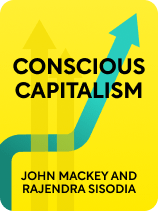

This article is an excerpt from the Shortform book guide to "Conscious Capitalism" by John Mackey and Rajendra Sisodia. Shortform has the world's best summaries and analyses of books you should be reading.
Like this article? Sign up for a free trial here.
What is conscious capitalism? Why is there a need for an improved version of capitalism?
In Conscious Capitalism, John Mackey and Rajendra Sisodia explain why they believe free-market capitalism benefits people, despite common critiques of the system. They further explain how conscious capitalism improves on traditional capitalism, addressing those critiques.
Continue reading for a breakdown of conscious capitalism and how it benefits businesses.
Free-Market Capitalism Is Good for You
What is conscious capitalism? Conscious capitalism is even better than traditional capitalism because it benefits all parties, including the environment and society at large. But that doesn’t mean traditional capitalism is all bad. According to Mackey and Sisodia, free-market capitalism is the ideal economic system. They believe it’s had a more positive influence on humanity than any other human invention because it enables entrepreneurs to come up with innovative solutions to the world’s problems. Thus, the authors attribute gains in quality of life over the last 200 years—including technology advances, greater global connectivity, and improved human health, literacy, and democratic equality—to free-market capitalism. They also explain that free-market capitalism has proven itself to be better than socialist alternatives, as evidenced by socialism’s inability to gain and keep a foothold anywhere in the world. (Shortform note: Five countries currently claim to socialist.)
However, the authors recognize that capitalism has come under scrutiny in recent years—and they argue that it’s because while capitalism is theoretically sound, businesspeople have understood and implemented it poorly. They explain that people commonly hold three mistaken beliefs about capitalism’s utility:
First, people mistakenly believe that capitalism worsens inequality because businesspeople can sometimes be cutthroat and self-serving, which widens the gap between the rich and the poor. The authors argue that according to the theoretical basis of capitalism, this shouldn’t happen: Adam Smith (an economist who was one of capitalism’s founding fathers) argued that an inherent purpose of doing business is to help one another and improve the world.
Second, people mistakenly believe that capitalism inevitably causes social and environmental problems because many businesses prioritize profits at the expense of the public and the environment. The authors explain that according to the theoretical basis of capitalism, businesspeople shouldn’t prioritize profits—they should be inspired by their passion for improving the world and pursue profits only because doing so enables them to solve social and environmental problems.
Third, people mistakenly believe that capitalism is unfair because it leads to cronyism—the use of government connections to gain more than their fair share of profits and undermine the free market. According to the authors, the theoretical basis of capitalism is inherently fair, voluntary, and democratic—everyone has a chance to succeed.
How Conscious Capitalism Addresses Common Critiques of Capitalism
Mackey and Sisodia argue that businesses must align their actions with society’s ever-advancing ideals, or else they’ll fail. The authors explain that over the last 200 years, people have become more enlightened—and as their values, knowledge, and connections to one another have improved, society has become increasingly free of cruelty and violence. Most people want society to continue improving in this way, so they reject businesses that perpetuate cruelty and violence—and they’re more critical of variants of capitalism that enable businesses to do so.
According to Mackey and Sisodia, to align their actions with society’s values, businesses must practice “conscious capitalism”: a business model that benefits all interested parties, from customers to investors to society and the environment. The authors say that conscious capitalism is true to the theoretical basis of capitalism because the ultimate goal of businesses who practice it is to satisfy everyone involved—under distorted forms of capitalism, the ultimate goal of a business is to make money, and it only satisfies interested parties as a means to do that.
Since conscious capitalism benefits everyone, the authors say it nullifies the three common critiques of capitalism listed above—and it doesn’t perpetuate cruelty or violence.
The authors also argue that since everyone benefits from conscious capitalism, this model has the potential to empower all people around the world to flourish if it’s widely practiced. As a result of their flourishing, everyone will have the ability to contribute innovative solutions to contemporary problems—which means that ultimately, conscious capitalism is capable of solving any problem we encounter.

———End of Preview———
Like what you just read? Read the rest of the world's best book summary and analysis of John Mackey and Rajendra Sisodia's "Conscious Capitalism" at Shortform.
Here's what you'll find in our full Conscious Capitalism summary:
- That capitalism is inherently good for people, but we're doing it wrong
- How conscious capitalism benefits both consumers and businesses
- How to meet the interests of all parties without sacrificing anyone's needs






